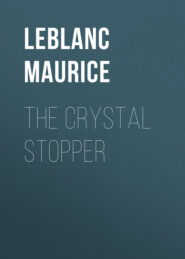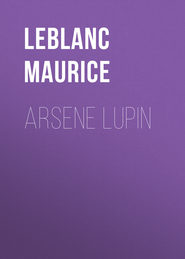По всем вопросам обращайтесь на: info@litportal.ru
(©) 2003-2024.
✖
The Eight Strokes of the Clock
Настройки чтения
Размер шрифта
Высота строк
Поля
"Forgive me, won't you?" said Rénine, as he opened the door of the drawing-room for Hortense. "I thought that, whatever happened, I should most likely see you this evening and that we might as well dine together. Don't refuse me this kindness, which will be the last favour granted in our last adventure."
Hortense did not refuse him. The manner in which the battle had ended was so different from everything that she had seen hitherto that she felt disconcerted. At any rate, why should she refuse, seeing that the terms of the contract had not been fulfilled?
Rénine left the room to give an order to his manservant. Two minutes later, he came back for Hortense. It was then a little past seven.
There were flowers on the table; and the statue of Mercury, Pancaldi's present, stood overtopping them.
"May the god of luck preside over our repast," said Rénine.
He was full of animation and expressed his great delight at having her sitting opposite him:
"Yes," he exclaimed, "I had to resort to powerful means and attract you by the bait of the most fabulous enterprises. You must confess that my letter was jolly smart! The three rushes, the blue gown; simply irresistible! And, when I had thrown in a few puzzles of my own invention, such as the seventy-five beads of the necklace and the old woman with the silver rosary, I knew that you were bound to succumb to the temptation. Don't be angry with me. I wanted to see you and I wanted it to be today. You have come and I thank you."
He next told her how he had got on the track of the stolen trinket:
"You hoped, didn't you, in laying down that condition, that I shouldn't be able to fulfil it? You made a mistake, my dear. The test, at least at the beginning, was easy enough, because it was based upon an undoubted fact: the talismanic character attributed to the clasp. I had only to hunt about and see whether among the people around you, among your servants, there was ever any one upon whom that character may have exercised some attraction. Now, on the list of persons which I succeeded in drawing up. I at once noticed the name of Mlle. Lucienne, as coming from Corsica. This was my starting-point. The rest was a mere concatenation of events."
Hortense stared at him in amazement. How was it that he was accepting his defeat with such a careless air and even talking in a tone of triumph, whereas really he had been soundly beaten by Pancaldi and even made to look just a trifle ridiculous?
She could not help letting him feel this; and the fashion in which she did so betrayed a certain disappointment, a certain humiliation:
"Everything is a concatenation of events: very well. But the chain is broken, because, when all is said, though you know the thief, you did not succeed in laying hands upon the stolen clasp."
The reproach was obvious. Rénine had not accustomed her to failure. And furthermore she was irritated to see how heedlessly he was accepting a blow which, after all, entailed the ruin of any hopes that he might have entertained.
He did not reply. He had filled their two glasses with champagne and was slowly emptying his own, with his eyes fixed on the statuette of Mercury. He turned it about on its pedestal and examined it with the eye of a delighted connoisseur:
"What a beautiful thing is a harmonious line! Colour does not uplift me so much as outline, proportion, symmetry and all the wonderful properties of form. Look at this little statue. Pancaldi's right: it's the work of a great artist. The legs are both slender and muscular; the whole figure gives an impression of buoyancy and speed. It is very well done. There's only one fault, a very slight one: perhaps you've not noticed it?"
"Yes, I have," said Hortense. "It struck me the moment I saw the sign, outside. You mean, don't you, a certain lack of balance? The god is leaning over too far on the leg that carries him. He looks as though he were going to pitch forward."
"That's very clever of you," said Rénine. "The fault is almost imperceptible and it needs a trained eye to see it. Really, however, as a matter of logic, the weight of the body ought to have its way and, in accordance with natural laws, the little god ought to take a header."
After a pause he continued:
"I noticed that flaw on the first day. How was it that I did not draw an inference at once? I was shocked because the artist had sinned against an aesthetic law, whereas I ought to have been shocked because he had overlooked a physical law. As though art and nature were not blended together! And as though the laws of gravity could be disturbed without some fundamental reason!"
"What do you mean?" asked Hortense, puzzled by these reflections, which seemed so far removed from their secret thoughts. "What do you mean?"
"Oh, nothing!" he said. "I am only surprised that I didn't understand sooner why Mercury did not plump forward, as he should have done."
"And what is the reason?"
"The reason? I imagine that Pancaldi, when pulling the statuette about to make it serve his purpose, must have disturbed its balance, but that this balance was restored by something which holds the little god back and which makes up for his really too dangerous posture."
"Something, you say?"
"Yes, a counterweight."
Hortense gave a start. She too was beginning to see a little light. She murmured:
"A counterweight?… Are you thinking that it might be … in the pedestal?"
"Why not?"
"Is that possible? But, if so, how did Pancaldi come to give you this statuette?"
"He never gave me this one," Rénine declared. "I took this one myself."
"But where? And when?"
"Just now, while you were in the drawing-room. I got out of that window, which is just over the signboard and beside the niche containing the little god. And I exchanged the two, that is to say, I took the statue which was outside and put the one which Pancaldi gave me in its place."
"But doesn't that one lean forward?"
"No, no more than the others do, on the shelf in his shop. But Pancaldi is not an artist. A lack of equilibrium does not impress him; he will see nothing wrong; and he will continue to think himself favoured by luck, which is another way of saying that luck will continue to favour him. Meanwhile, here's the statuette, the one used for the sign. Am I to break the pedestal and take your clasp out of the leaden sheath, soldered to the back of the pedestal, which keeps Mercury steady?"
"No, no, there's no need for that," Hortense hurriedly murmured.
Rénine's intuition, his subtlety, the skill with which he had managed the whole business: to her, for the moment, all these things remained in the background. But she suddenly remembered that the eighth adventure was completed, that Rénine had surmounted every obstacle, that the test had turned to his advantage and that the extreme limit of time fixed for the last of the adventures was not yet reached.
He had the cruelty to call attention to the fact:
"A quarter to eight," he said.
An oppressive silence fell between them. Both felt its discomfort to such a degree that they hesitated to make the least movement. In order to break it, Rénine jested:
"That worthy M. Pancaldi, how good it was of him to tell me what I wished to know! I knew, however, that by exasperating him, I should end by picking up the missing clue in what he said. It was just as though one were to hand some one a flint and steel and suggest to him that he was to use it. In the end, the spark is obtained. In my case, what produced the spark was the unconscious but inevitable comparison which he drew between the cornelian clasp, the element of luck, and Mercury, the god of luck. That was enough. I understood that this association of ideas arose from his having actually associated the two factors of luck by embodying one in the other, or, to speak more plainly, by hiding the trinket in the statuette. And I at once remembered the Mercury outside the door and its defective poise...."
Rénine suddenly interrupted himself. It seemed to him that all his remarks were falling on deaf ears. Hortense had put her hand to her forehead and, thus veiling her eyes, sat motionless and remote.
She was indeed not listening. The end of this particular adventure and the manner in which Rénine had acted on this occasion no longer interested her. What she was thinking of was the complex series of adventures amid which she had been living for the past three months and the wonderful behaviour of the man who had offered her his devotion. She saw, as in a magic picture, the fabulous deeds performed by him, all the good that he had done, the lives saved, the sorrows assuaged, the order restored wherever his masterly will had been brought to bear. Nothing was impossible to him. What he undertook to do he did. Every aim that he set before him was attained in advance. And all this without excessive effort, with the calmness of one who knows his own strength and knows that nothing can resist it.
Then what could she do against him? Why should she defend herself and how? If he demanded that she should yield, would he not know how to make her do so and would this last adventure be any more difficult for him than the others? Supposing that she ran away: did the wide world contain a retreat in which she would be safe from his pursuit? From the first moment of their first meeting, the end was certain, since Rénine had decreed that it should be so.
However, she still cast about for weapons, for protection of some sort; and she said to herself that, though he had fulfilled the eight conditions and restored the cornelian clasp to her before the eighth hour had struck, she was nevertheless protected by the fact that this eighth hour was to strike on the clock of the Château de Halingre and not elsewhere. It was a formal compact. Rénine had said that day, gazing on the lips which he longed to kiss:
"The old brass pendulum will start swinging again; and, when, on the fixed date, the clock once more strikes eight, then...."
She looked up. He was not moving either, but sat solemnly, patiently waiting.
She was on the point of saying, she was even preparing her words:
"You know, our agreement says it must be the Halingre clock. All the other conditions have been fulfilled … but not this one. So I am free, am I not? I am entitled not to keep my promise, which, moreover, I never made, but which in any case falls to the ground?… And I am perfectly free … released from any scruple of conscience?…"
She had not time to speak. At that precise moment, there was a click behind her, like that of a clock about to strike.
A first stroke sounded, then a second, then a third.











